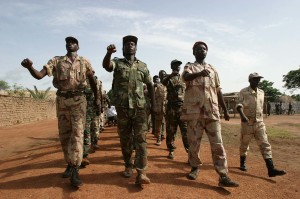Killing and kidnapping by terrorist group continues in Nigeria, despite alleged ceasefire. The ceasefire, between the Nigerian Government and terrorist group Boko Haram, was officially reported October 17, but the group has not confirmed the ceasefire and continue violent actions.
 The Boko Haram is an Islamic group that was founded in 2002. Their full name, Jama’atu Ahlis Sunna Lidda’awati Wal-Jihad, translates to “people committed to the propagation of the Prophet’s teachings and jihad” according to the Council for Foreign Relations (CFR). However, their more common name, Boko Haram, translates to “Western education is a sin.” The group rejects Western concepts such as the big bang and evolution theory.
The Boko Haram is an Islamic group that was founded in 2002. Their full name, Jama’atu Ahlis Sunna Lidda’awati Wal-Jihad, translates to “people committed to the propagation of the Prophet’s teachings and jihad” according to the Council for Foreign Relations (CFR). However, their more common name, Boko Haram, translates to “Western education is a sin.” The group rejects Western concepts such as the big bang and evolution theory.
Boko Haram gunmen have been accused of abducting at least 30 boys and girls from the village of Mafa, northeast Nigerian state of Borno, last Friday and Saturday. A CNN article said heavily armed gunmen entered the village and abducted the children, as young as 11. It is speculated the children will be used as foot soldiers. Local leaders complained the government military has done nothing to stop the raids.
CNN also reported several other raids. Sixty women and girls were taken from two Christian villages in the neighboring Adamawa state last week. Additionally, the group also raided the nearby village of Ndongo, killing 17 people, looting and burning the location.
Between 2002 and 2009 Boko Haram was not involved in trying to violently overthrow the government. However, in 2009 unrest broke out when group members refused to obey a motorbike helmet law. The government responded with strong police tactics and which involved brutality according to the CFR.
 During the 2009 unrest, revolts broke out in the state of Bauchi and spread to the neighboring states of Borno, Yobe, and Kano. The conflicts left eight hundred dead. As a result of the conflict, Boko Haram’s leader, Mohammed Yusuf, was publicly executed. Since then, the unrest has spiraled out of control and the group has launched military operations to create an Islamic state.
During the 2009 unrest, revolts broke out in the state of Bauchi and spread to the neighboring states of Borno, Yobe, and Kano. The conflicts left eight hundred dead. As a result of the conflict, Boko Haram’s leader, Mohammed Yusuf, was publicly executed. Since then, the unrest has spiraled out of control and the group has launched military operations to create an Islamic state.
In May 2013, the Nigerian Government assembled a joint task force and declared a state of emergency in three northern states of Borno, Yobe, and Adamawa. The force pushed Boko Haram out of the city, but violence continued in rural areas.
In 2013 experts began seeing influences from al-Qaeda in the Islamic Maghreb, a Northern Africa terrorist group, in Boko Haram’s operations, according to the CFR. They were officially declared a foreign terrorists organization by the U.S. State Department. Attacks have been targeted towards civilians, including beheading truck drivers with chainsaws, killing travelers along northern roads, and then in September 2013, the killing of 65 students while they slept at an agricultural college in Yobe state. In April, the group bombed a bus stop in Abuja, the capital of Nigeria, killing nearly one hundred people.
In April, 219 girls were kidnapped by the group, sparking international protest and provoking the hashtag on social media “bringbackourgirls.” The fate of the kidnapped girls is still unknown. While the Nigerian government was negotiating and hoping for their release, recent violent events in spite of the ceasefire have rendered future of the abducted girls more uncertain.
